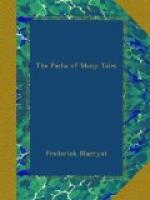“Even so, O Sustenance of the world,” responded the slave.
“Was it not rather an angel than a mortal, whose mellifluous notes accompanied the instrument?” said the magnificent Youantee.
“Certainly is she blessed beyond mortality, since her melody has found favour in the celestial ears,” replied the black keeper of the Yellow Tower.
“Go then, and quickly summon all our highest officers of state, to lay their robes upon the ground, that she may pass over them to our presence at the dragon below the terrace.”
The magnificent Youantee, brother of the sun and moon, returned to his former seat, filled with pleasing anticipations, while the eunuch hastened to obey the celestial commands. The mandarins of the first class hastened to obey the orders of Youantee; their furred and velvet cloaks, rich in gold and silver ornaments, were spread from the tower to the dragon at the terrace, forming a path rich and beautiful as the milky way in the heavens. The pearl beyond price, the peerless Chaonkeun, like the moon in her splendour, passed over it into the presence of the great Youantee.
“Immortal Fo,” exclaimed the emperor, as the attendants raised their lanterns, so as to throw light upon her countenance, “by what black mischance have such charms been hidden from our sight?”
Then did the peerless Chaoukeun narrate, in few words, the treachery and avarice of Suchong Pollyhong Ka-te-tow.
“Hasten, O mandarins, let the scissors of disgrace cut off the two tails of this wretch, and then let the sword of justice sever off his head.”
But the rumour of his sentence flew on the wind to Suchong Pollyhong Ka-te-tow; and before the executioner could arrive, he had mounted a horse fleeter than the wind, and with the portrait of the peerless Chaoukeun in his vest, had left even rumour far behind.
Ti-tum, tilly-lilly, ti-tum, tilly-lilly, ti-tum, ti.
And to whom did the miscreant minister fly, to hide his devoted head? He flew to the wild nations of the north, the riders of wild horses, with sharp scimitars and long lances. For three days and three nights did the hoofs of his fiery steed strike fire upon the flints, which he spurned in his impetuous course, and then, as an immortal poet hath already sung, “he bowed his head and died.” With the portrait of the peerless Chaoukeun in his bosom, and his mandarin garments raised up under each arm, the miscreant Suchong Pollyhong Ka-te-tow reached the presence of the Great Khan. “O Khan of Tartary,” said he, “may thy sword be ever keen, thy lance unerring, and thy courser swift. I am thy slave. O thou who commandest a hundred thousand warriors, hath thy slave permission to address thee?”
“Speak, and be d——d,” replied the warrior chief, of few words, whose teeth were busy with some pounds of horse-flesh.
“Thou knowest, O Khan, that it hath been the custom for ages, that the celestial empire should provide for thee a fair damsel for thy nuptial bed, and that this hath been the price paid by the celestial court, to prevent the ravages of thy insatiate warriors. O Khan, there is a maid, whose lovely features I now have with me, most worthy to be raised up to thy nuptial couch.” And the miscreant laid at the feet of the Great Khan the portrait of the peerless Chaoukeun.




